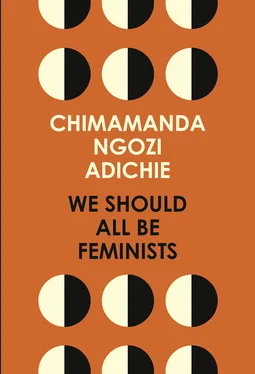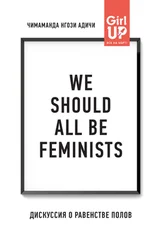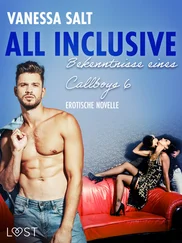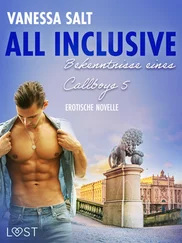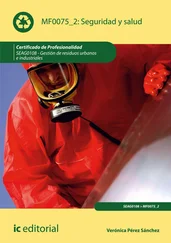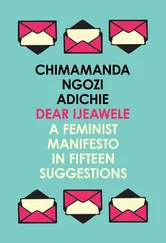Chimamanda Ngozi Adichie
We Should All Be Feminists


Fourth Estate
An imprint of HarperCollins Publishers
77–85 Fulham Palace Road,
Hammersmith, London W6 8JB
4thestate.co.uk
This eBook first published in Great Britain by Fourth Estate 2014
First published as a Vintage Original eBook in the United States in 2014 by Vintage Books, a division of Random House, LLC, New York, a Penguin Random House company
Copyright © Chimamanda Ngozi Adichie 2014
We Should All Be Feminists was first presented as a TED talk given in the United Kingdom at TEDxEuston, in 2012
Chimamanda Ngozi Adichie asserts the moral right to be identified as the author of this work
A catalogue record of this book is available from the British Library
All rights reserved under International and Pan-American Copyright Conventions. By payment of the required fees, you have been granted the non-exclusive, non-transferable right to access and read the text of this e-book on screen. No part of this text may be reproduced, transmitted, down-loaded, decompiled, reverse engineered, or stored in or introduced into any information storage and retrieval system, in any form or by any means, whether electronic or mechanical, now known or hereinafter invented, without the express written permission of HarperCollins.
Source ISBN: 9780008115272
Ebook Edition © October 2014 ISBN: 9780008115289
Version: 2014-08-22
This is a modified version of a talk I delivered in December 2012 at TEDxEuston, a yearly conference focused on Africa. Speakers from diverse fields deliver concise talks aimed at challenging and inspiring Africans and friends of Africa. I had spoken at a different TED conference a few years before, giving a talk titled ‘The Danger of the Single Story’ about how stereotypes limit and shape our thinking, especially about Africa. It seems to me that the word feminist , and the idea of feminism itself, is also limited by stereotypes. When my brother Chuks and best friend Ike, both co-organizers of the TEDxEuston conference, insisted that I speak, I could not say no. I decided to speak about feminism because it is something I feel strongly about. I suspected that it might not be a very popular subject, but I hoped to start a necessary conversation. And so that evening as I stood onstage, I felt as though I was in the presence of family – a kind and attentive audience, but one that might resist the subject of my talk. At the end, their standing ovation gave me hope.
We Should All Be Feminists
Okoloma was one of my greatest childhood friends. He lived on my street and looked after me like a big brother: if I liked a boy, I would ask Okoloma’s opinion. Okoloma was funny and intelligent and wore cowboy boots that were pointy at the tips. In December 2005, in a plane crash in southern Nigeria, Okoloma died. It is still hard for me to put into words how I felt. Okoloma was a person I could argue with, laugh with and truly talk to. He was also the first person to call me a feminist.
I was about fourteen. We were in his house, arguing, both of us bristling with half-baked knowledge from the books we had read. I don’t remember what this particular argument was about. But I remember that as I argued and argued, Okoloma looked at me and said, ‘You know, you’re a feminist.’
It was not a compliment. I could tell from his tone – the same tone with which a person would say, ‘You’re a supporter of terrorism.’
Конец ознакомительного фрагмента.
Текст предоставлен ООО «ЛитРес».
Прочитайте эту книгу целиком, купив полную легальную версию на ЛитРес.
Безопасно оплатить книгу можно банковской картой Visa, MasterCard, Maestro, со счета мобильного телефона, с платежного терминала, в салоне МТС или Связной, через PayPal, WebMoney, Яндекс.Деньги, QIWI Кошелек, бонусными картами или другим удобным Вам способом.
